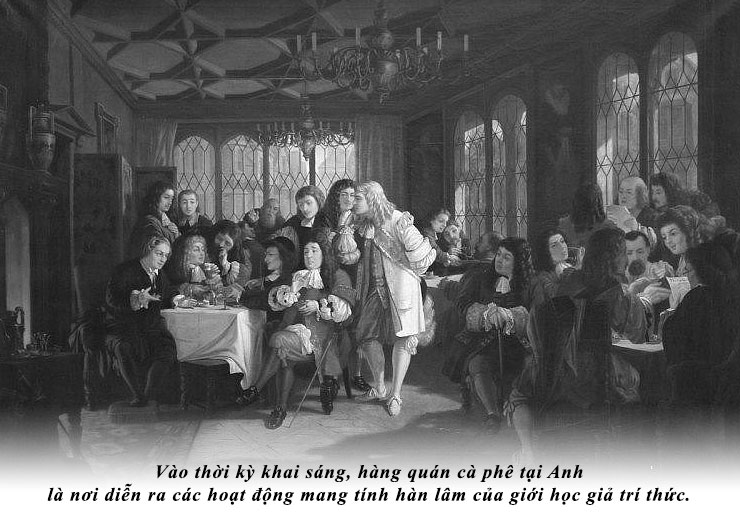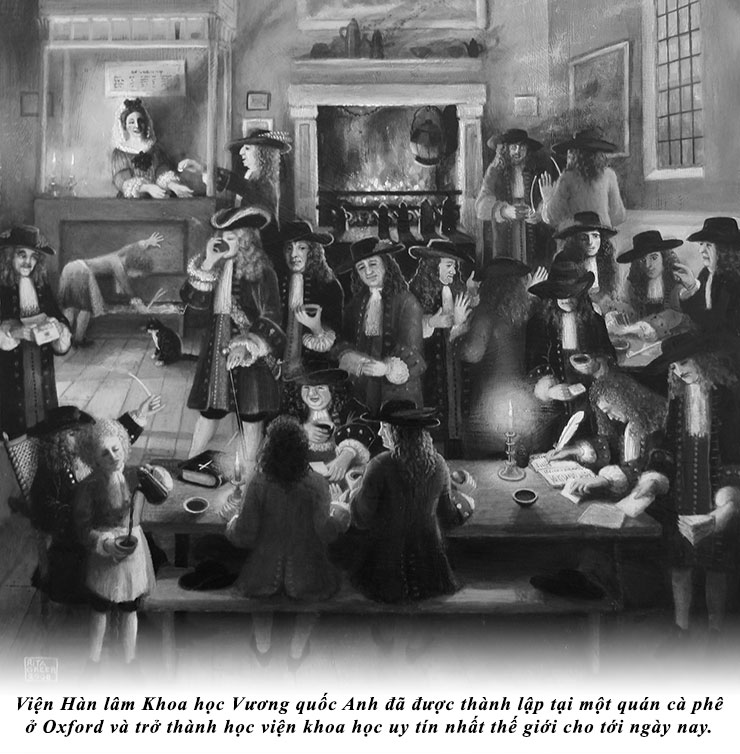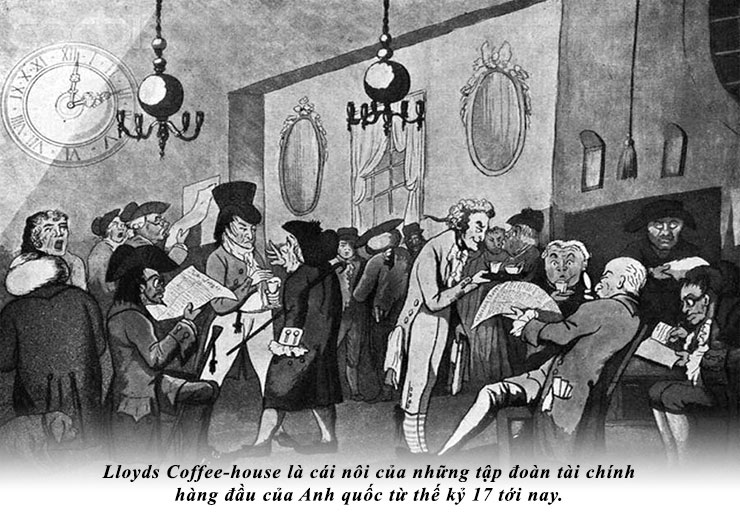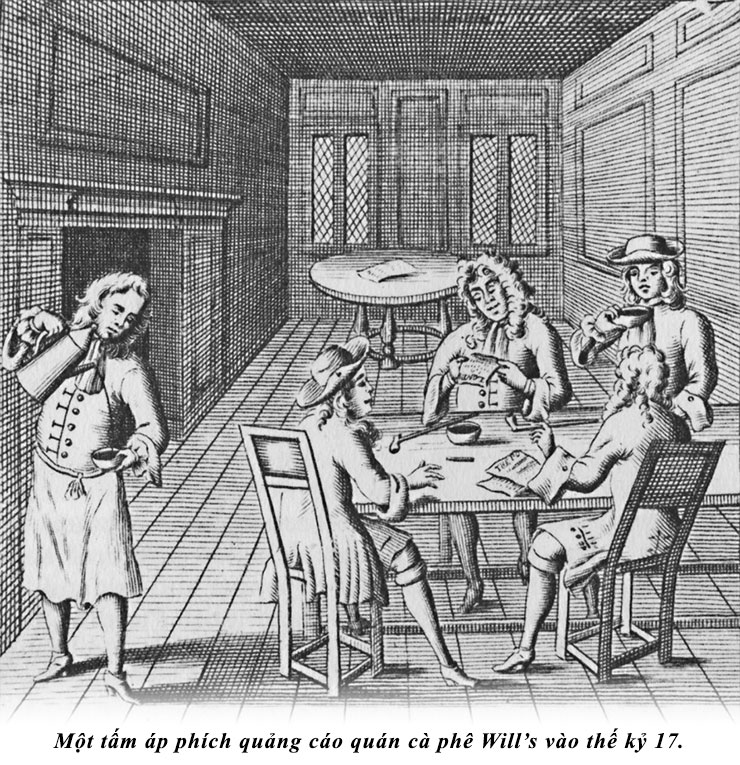Article 41: The university hidden in the British cafe
Coffee shops in the UK since their appearance had been shaped as a space of academic and economic activity, which dominated the logic of thinking of Western Europe.

“Coffee makes us severe, and grave, and philosophical” Jonathan Swift (1667-1745
Coffee shop – Penny university
Coffee was introduced to Western Europe in the 17th century at the same time as the Age of Enlightenment. The UK was one of the first countries to have access to the creative, awakening energy of this special drink. However, if in Paris (France), Vienna (Austria)… cafes were located on central boulevards, in the UK, coffee shops were formed on somewhat obscured streets, near Universities of London, Oxford, Edinburgh…
This difference makes perfect sense when placed in the historical course of this period. In the 17th-18th centuries, France, Portugal, the Netherlands… had colonies of coffee-growing countries, and Great Britain was a rich mother country thanks to tea-growing colonies. By pragmatic calculation, the nobility, the British Royal Family chose tea as a drink that brought pride to the “tea kingdom” to promote consumption of this drink. Conversely, if coffee became a popular drink like other Western European countries, it would mean that the UK had to buy the product of a competitor. This was not supported by the Royal aristocracy. That’s why coffee shops in the UK have to hide themselves around the university.

At the time of the Enlightenment, British cafes were the place where the academic activities of intellectuals took place.
Not valued by the royal family, however, the operation form of the cafe provided an ideal space for study and research. Students and scholars with the same goal of pursuing intellectual progress spent hours sitting at a coffee shop to seriously discuss issues of life philosophy, world affairs and valuable discoveries. From here, British cafes were honored as “Penny Universities”
The name “Penny Universities” derived from the price per cup of coffee and the seat for a session (morning-afternoon-evening) at the cafe. Contrary to tea rooms or pubs, coffee shops were fertile ground for academic and application activities in many fields: science, economics, agriculture, industry, commerce… Historical evidence shows that from the “hidden universities” in the UK, a series of academic theories in many fields have influenced the development of mankind.
The doctrine of humanity and global organizations start at the coffee shop
The first is the Oxford University coffee club. In the cafe space here, the father of economics – Adam Smith gave birth to classics such as: The Theory of Moral Sentiments, The Wealth of Nations, the doctrines of the capitalist economy… has profound influence on the modern market economy as well as today’s moral and philosophical ideas.

The UK’s National Science Academy was founded in a coffee shop in Oxford and has been to this day the most prestigious scientific institution in the world.
In 1660, Tilliard’s coffee shop was the place where the Royal Society was founded. The Royal Society is the forerunner of the UK’s National Science Academy – the most prestigious scientific academy in the world, growing to more than 8,000 members to this day, with big names like: Isaac Newton, Charles Darwin, Benjamin Franklin, Albert Einstein, Stephen Hawking…
Meanwhile, from the coffee shop at the University of Edinburgh, philosopher, economist, historian David Hume wrote many influential works on modern philosophy such as: A Treatise of Human Nature, An Enquiry Concerning Human Understanding, An Enquiry Concerning the Principles of Morals…

Lloyds Coffee-house is the cradle of Britain’s leading financial groups from the 17th century to the present.
Not only was the place of origin for academic theories, but the “hidden universities” in the UK were also the birthplace of famous corporations, economic and financial organizations. In London, the insurance group Lloyd’s was established at the Lloyds Coffee-house; the UK’s Royal Exchange had its roots in the Jonathan’s cafe; London Shipping Exchange was born in the Baltic cafe… And Will’s Coffee House was called a “literary house” when it became a meeting place for big names in literature such as: Jonathan Swift, Alexander Pope, Joseph Addison…

A poster advertising Will’s cafe in the 17th century
It can be said that coffee has developed in the UK in a different way compared to the countries in the Western European continent, but thanks to that, it has opened the way for coffee to contribute to the aspirations of the times by its humanity-enlightening achievements in the “Penny University”.
THE REAL COFFEE
ROASTED ONLY FOR PEOPLE OF WISDOM!
Source: “The Philosophical Way of Coffee” – copyright by Trung Nguyen Legend


